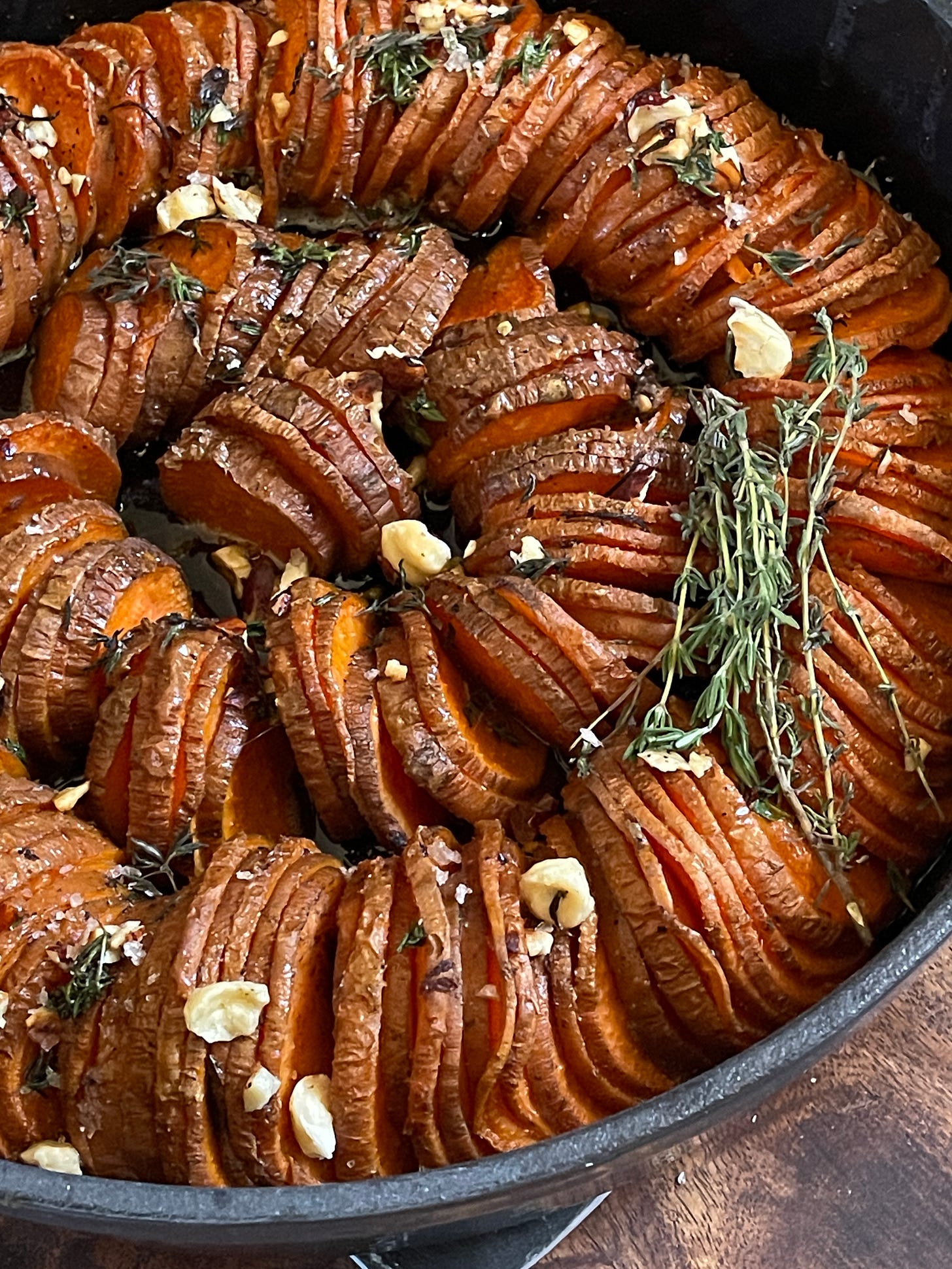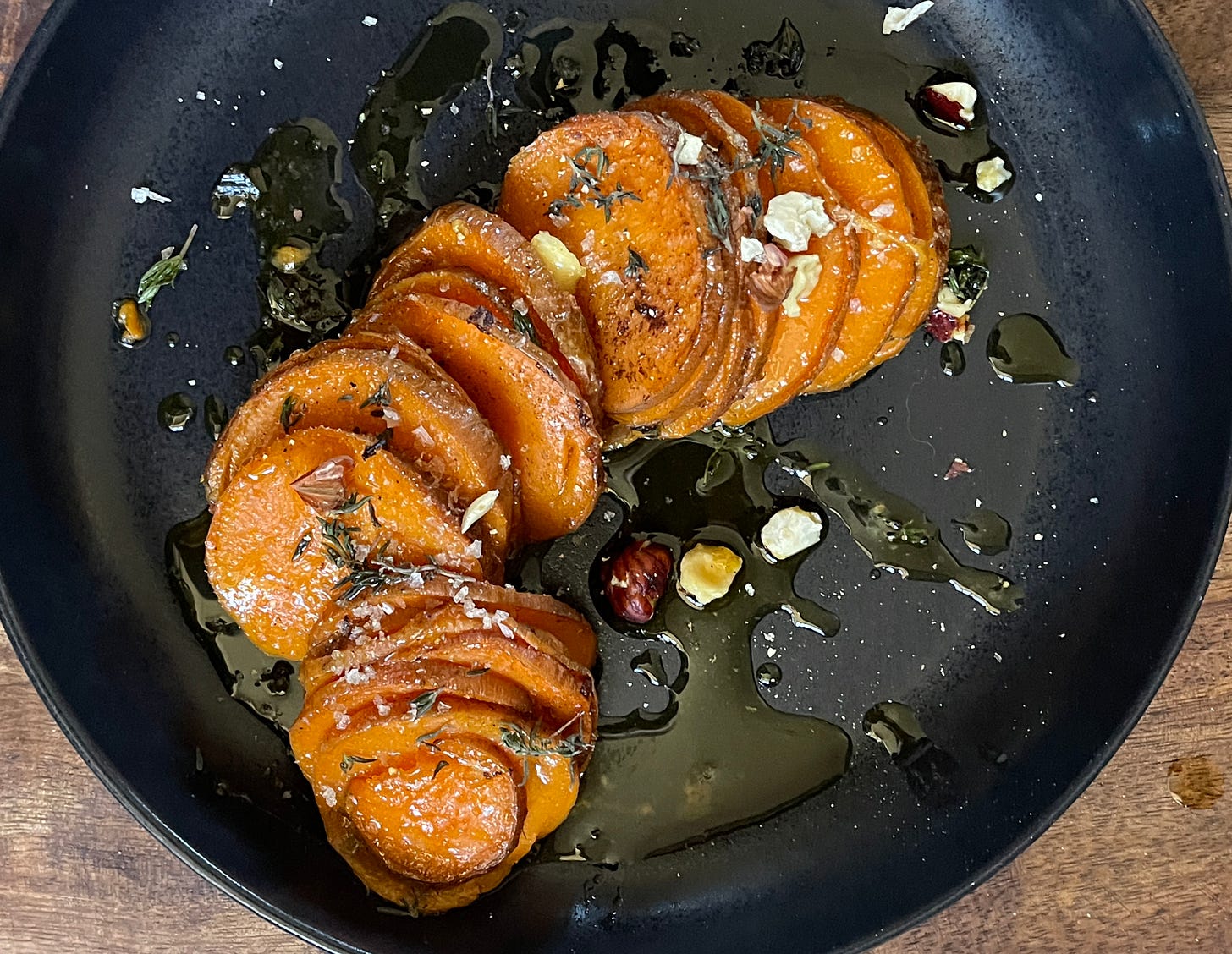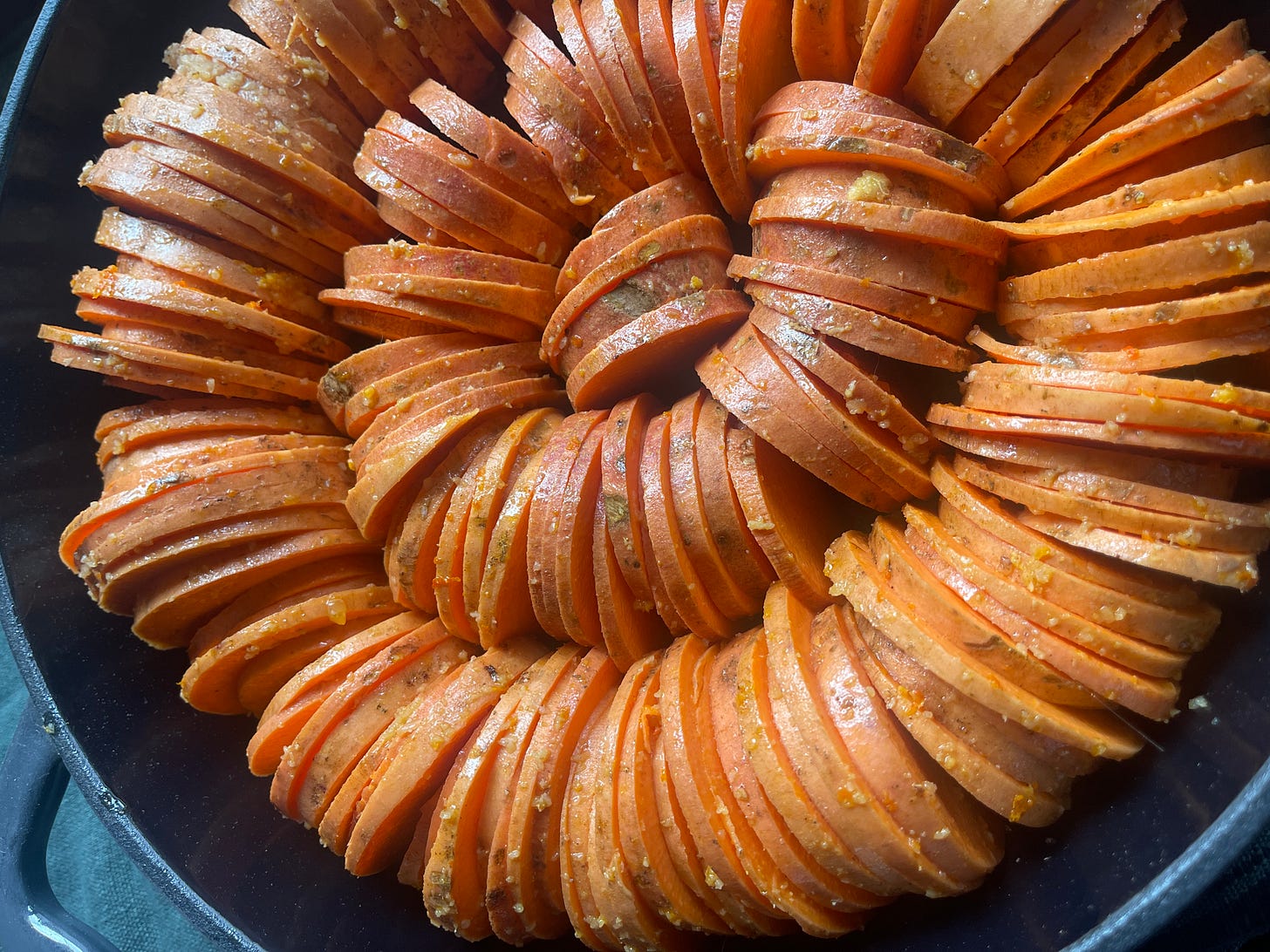Moscow & Minsk with Jimmy Carter's Friendship Force
With a comforting winter recipe for miso-brown butter sweet potatoes
Welcome to What’s Good Here, a weekly newsletter of recipes, guides, inspiration and expat news. Thank you for being here! This post is free, so please feel free to share it with the food and travel lovers in your life. What’s Good Here is a reader-supported endeavor. To support this publication and to gain access to all recipes, guides, giveaways and other perks, please consider becoming a subscriber. Thank you!
With the passing of Jimmy Carter this week, I’ve been reflecting on my trip to Russia and Belarus in the 1990s with The Friendship Force, an organization Carter co-founded in the 1970s to foster peace and global connection. It’s a mission rooted in the simple but profound idea that bringing people together can dissolve barriers and forge lasting friendships.
I first learned about The Friendship Force and its upcoming trip to Minsk, via Moscow, during a Russian Literature class at my university in Minnesota. Growing up during the Cold War, the Soviet Union felt like a shadowy, untouchable entity—a place we feared and misunderstood. We practiced fallout drills in school, huddling in a cafeteria back room that offered little real protection. We watched The Day After, a grim TV movie imagining life post-nuclear war, which only intensified our dread.
When my professor mentioned the trip, I was intrigued. The Soviet Union had always felt off-limits, a place that seemed hostile by its very nature. But with the fall of the Berlin Wall and an era of tenuous openness under Gorbachev and Yeltsin, the opportunity to visit was too tempting to resist. A few weeks later, I was on a plane to Moscow with a group of fellow Minnesotans, suitcases packed with Hershey bars, Levi’s, Marlboros—and Spam, donated by a Hormel executive in our group.
Packing Staples: Spam and Red Lipstick From L’Oreal
At first, I was embarrassed about the Spam. Who would want it? But in a society operating under a coupon system that permitted only bare-minimum rations, a can of Spam was a prized possession. To the families we met, it symbolized abundance and luxury. In one household, I saw a can displayed on a shelf like a trophy, saved for a special occasion.
The red lipstick donated by a L’Oréal executive was another revelation. I couldn’t understand at first why people who had lived under such a grim and oppressive regime would care about makeup. But in the remote Belarusian villages we visited, women applied their new lipstick with reverence, marveling at its vibrancy. After years of drabness and deprivation, that bold, bright red was a defiant act of self-expression, a small but powerful reminder that beauty and joy could still exist.
Red Square, the KGB & A Vodka Fueled Night Train Journey to Minsk
Our first week in Moscow felt surreal. The city’s grandiose train stations sparkled with crystal chandeliers, and we walked solemnly past Lenin’s embalmed body in Red Square. Yet the grandeur was juxtaposed with whispers of fear. I asked Galena, the mother of the host family I would stay with in Minsk, why everyone spoke so softly. She replied, “When you’ve lived in a system where neighbors could turn you in to the KGB, you learn to whisper.”
From Moscow, we boarded a night train to Minsk. Amy, another participant, and I shared a cabin on that dreamlike 24-hour journey, where steaming tea in silver cups and plates of caviar punctuated icy vodka toasts offered by our ushanka-clad steward. The red velvet banquettes and swirling conversations—none of which we understood—felt like stepping into Anna Karenina.
A Different Kind of Grocery Store Coupon
When we arrived in Minsk, the city in winter was a vision of gray: muted skies, cold concrete buildings, and people wrapped in layers against the chill. At the time, life in Belarus was dictated by a coupon system. Families were allotted meager rations—barely enough to scrape by. Grocery shopping involved navigating dimly lit halls stocked with scant supplies. Once you were out of coupons, that was it for the month.
The Friendship Force’s mission was to stay with local families and then host them in return. My host family—Galena, an Oxford-educated attorney; her husband Boris, a high-level government worker; and their teenage children, Dasha and Andre—welcomed me and Amy into their lives for two months. Dasha, their daughter, would later visit me in the U.S. Many of the other Friendship Force participants stayed with ballerinas from the country’s famed Bolshoi Ballet, an offshoot of Russia’s legendary ballet company.
Daily life in Minsk was a study in resilience. Galena grew vegetables at their dacha in the countryside to supplement their diet. Potatoes, carrots, and thyme were staples, transformed with care into nourishing meals despite their simplicity. I marveled at how Galena could turn slices of potato and a sprig of thyme into something artful. Her creativity in the face of scarcity still inspires me—and this recipe, a nod to her, serves as a quiet tribute to her resourcefulness.
No Truth in Pravda
But there were moments of stark clarity about the falsehoods shaping their daily lives. The news, on a constant loop, replayed the same ten minutes of state-approved propaganda. When I asked Galena why it was always on, she laughed and whispered, “Like Pravda, the newspaper that means ‘truth,’ but contains no truth, the news here is just for show. We keep it on so the government knows we’re watching.”
Boris, who often traveled to Moscow for his high-level government job, gave me his medal for 25 years of service. I told him it was too generous a gift. He laughed bitterly and said, “I should have had it burned, but someone might find out and turn me in. Let’s be honest, my career was a farce because the government is a farce. You know what isn’t a farce? The truth—real news, facts, science. That’s what matters.”
Beyond their resilience, the people we met in Minsk showed extraordinary grace. The dancers at the Bolshoi kept rehearsing. The hockey players kept competing. Artists painted, wrote, and played music, finding ways to resist the false narratives around them. Even the elderly women in the villages applied their new red lipstick with pride, a small rebellion against the drabness of their daily lives.
Reconnecting with Helena, Whose Father Survived a Russian Gulag
One of the most poignant connections I made was with Helena, one of our translators. Her father had been sent to the Gulag for speaking out against the government, and when I met her, he had already been gone for five years. Helena had diabetes, and accessing insulin or clean needles was nearly impossible. The Friendship Force stepped in, coordinating with a pharmaceutical company to bring supplies on future trips, ensuring Helena and others had what they needed.
Sadly, I lost touch with Helena and my host family over the years. But a few months ago, Helena reached out to me through social media. It felt miraculous to hear from her after decades of searching. Now living as a translator for the European Union in Belgium, she is thriving, her diabetes under control. Her father, who spent 11 years in the Gulag, eventually returned home and never regretted the hardships he endured, believing his suffering was justified by his commitment to truth.
Helena and I have spoken often about the parallels between then and now. She fears the erosion of facts and empathy in today’s world but remains steadfast in her belief that truth and integrity will ultimately prevail. “Even if it’s quiet triumph,” she told me, “even if it’s just in your heart or among trusted friends, it matters.”
Thinking about Jimmy Carter’s passing and his hope that The Friendship Force would foster connection and lasting friendships, I can’t help but feel that reconnecting with Helena is proof of its success. Even decades later, those bonds endure—reminding us that in a world so often divided, our shared humanity can always bring us back together.
January Course with The London Writers Salon (get your 15% discount!)
On January 14th I’ll be joining a conversation with the London Writers' Salon, a vibrant community dedicated to helping writers succeed through daily writing sessions, expert interviews, and masterclasses.
In this session, I'll share insights from my experiences and discuss the journey of writing and publishing my latest cookbook, Elysian Kitchens along with a deep dive into how to navigate a career in the culinary world.
You can register here and use code LWSFRIEND15 for a 15% discount!
I look forward to connecting with you and the London Writers' Salon community!
Book News!
Elysian Kitchens was published on October 15th by W.W. Norton and is available online as well as in many independent bookstores. Here’s a quick roundup of some of the recent places where the book has been mentioned recently (more here).
If you’ve picked up a copy and enjoyed it, I’d be so grateful if you’d consider leaving a review—they truly help. There will be more news and behind-the-scenes stories about Elysian Kitchens in the coming months, along with an event series inspired by the book that kicks off in Minnesota in spring 2025, Ireland in July, and Italy and Portugal in October. More info will be available at the end of January.
Saveur Magazine: A feature story that highlighted the book's exploration of how food fuels faith in sacred spaces around the world. Elysian Kitchens was November’s selection for Saveur’s Cookbook Club.
TABLE Magazine: Included Elysian Kitchens in their list of best cookbooks of 2024, noting its captivating exploration of culinary traditions in religious communities.
Broadview: Featured an article delving into the hidden kitchens of monks, nuns, and mystics, as presented in the cookbook.
Civil Eats: Included Elysian Kitchens in their 2024 Food and Farming Holiday Book Gift Guide, highlighting its exploration of culinary traditions in sacred spaces.
The Central Minnesota Catholic: Discussed the talents of monks in the kitchen, as highlighted in Elysian Kitchens.
Louisiana Eats: I was delighted to reconnect with my longtime friend Poppy Tooker on her show, Louisiana Eats!, where we discussed the spiritual aspects of cooking and the culinary traditions featured in my latest cookbook, Elysian Kitchens. You can listen to our conversation here.
Independent Bookstores (shop!): Elysian Kitchens is available at many of your favorite independent bookstores including Book Larder in Seattle, Books for Cooks in London, Battenkill Books in Cambridge, NY, and Kitchens Arts & Letters in NYC.
The bond of our common humanity is stronger than the divisiveness of our fears and prejudices.
–Jimmy Carter
My newsletter is reader-supported.
Free subscribers get limited access to the weekly newsletter and two weeks worth of archives.
Paid subscribers get complete access to all of the content in my newsletters and my entire archives. You’ll also get all of the recipes, guides, interviews, cooking tips, essays and more, plus the ability to comment and participate in discussions.
In 2025, I will be offering my standard hygge workshops along with new workshops on cookbook writing, becoming an expat and more. Paid subscribers will receive a 50% discount on their first course. More info coming in the next newsletter.
Newsletters will arrive right in your Inbox or you can read them through the app.
Miso-Brown Butter Sweet Potatoes
Sweet potatoes are transformed into a stunning centerpiece with this recipe, which marries the earthy sweetness of roasted potatoes with the umami depth of miso and the nuttiness of brown butter. The toasted hazelnuts and fresh thyme add texture and fragrance, making this dish as visually delightful as it is flavorful. It's perfect for cozy gatherings or a creative twist to your weeknight meals. This recipe was inspired by the potatoes that Galena served to us every night during our stay in Minsk. I’d like to think she’d approve of the upgrade. Let me know how yours turns out, and don’t forget to share a photo if you give it a try!
Prep Time: 1 1/2 hours
Serves: 6
Ingredients:
2 large sweet potatoes, thinly sliced (use a mandoline for even slices)
3 tbsp unsalted butter (or plant-based butter for a vegan option)
1 tbsp white miso paste
2 tsp maple syrup
2 tsp fresh ginger, finely grated
2 cloves garlic, minced
1 tsp ground cinnamon
1 tbsp olive oil
3 sprigs fresh thyme, plus extra for garnish
1/4 cup hazelnuts, toasted and roughly chopped
Salt and pepper, to taste
Prepare the sweet potatoes: Preheat the oven to 375°F (190°C). Slice the sweet potatoes thinly using either a mandoline or a very sharp knife and arrange them vertically in a cast-iron skillet or baking dish.
Make the miso-brown butter: In a small saucepan, melt the butter over medium heat until it starts to foam and turn golden, releasing a nutty aroma. Remove from heat and whisk in the miso paste, maple syrup, grated ginger, minced garlic, and cinnamon. Stir until smooth.
Coat and bake: Drizzle the miso-brown butter mixture over the sweet potatoes, making sure it seeps between the slices. Add the sprigs of thyme on top and drizzle with olive oil. Cover with foil and roast for 45 minutes.
Finish roasting uncovered: Remove the foil and continue baking for another 20-30 minutes, or until the edges of the sweet potatoes are golden and slightly crispy.
Garnish and serve: Sprinkle the toasted hazelnuts over the top, along with additional fresh thyme. Season with salt and pepper to taste. Serve warm.
Expat Life: Advice, Tips, News and Encouragement
I relocated from America to Europe about four years ago and I’m always being asked what the experience has been like, how to do it, advice for making the process easier, and where to live.
It’s tricky, sometimes headache inducing, often nerve wracking, a bit baffling, but not impossible and at least for me, fulfilling, rewarding, and life enhancing. This weekly section explores what I’ve learned (and am continuing to learn) and highlights the most recent news and helpful advice for those who are thinking about exploring the expat life.
In this week’s edition of Expat Life: Expat Workshops!
After receiving countless questions about how to navigate the journey to becoming an expat, I’ll soon be offering workshops and consulting sessions on how you too can become an expat! Having successfully obtained long-term visas in the Czech Republic, Portugal, and Spain, I’ve learned the ins and outs of visas, social security, taxes, health insurance, and all the other intricacies of expat life. If you’ve ever dreamed of living abroad and want solid, practical advice from someone who’s been there and done it three times, consider becoming a free or paid subscriber. Registration details for the workshops will be shared in upcoming newsletters this month!
Let’s Talk!
Please join the What’s Good Here community by posting a comment or to just say hello to get the conversation started! (for paid subscribers only)
Image attributions throughout the newsletter are mine, unless otherwise noted.
If you would like to learn more about me and discover what I will deliver to you each week through this newsletter, you can find that information here or check out my Instagram or website.







